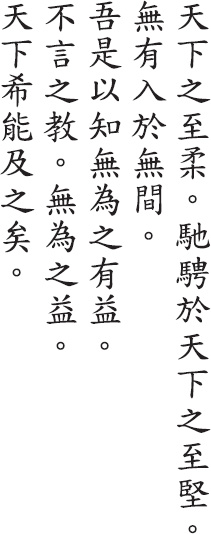43
 |
The weakest thing in the world overcomes the strongest thing in the world what doesn’t exist finds room where there’s none thus we know help comes with no effort wordless instruction effortless help few in the world can match this |
LAO-TZU says, “Nothing in the world is weaker than water / but against the hard and the strong / nothing outdoes it” (Taoteching: 78).
WANG TAO says, “Eight feet of water can float a thousand-ton ship. Six feet of leather can control a thousand-mile horse. Thus does the weak excel the strong. Sunlight has no substance, yet it can fill a dark room. Thus, what doesn’t exist enters what has no cracks.”
Concerning the first two lines, HUAI-NAN-TZU says, “The light of the sun shines across the Four Seas but cannot penetrate a closed door or a covered window. While the light of the spirit reaches everywhere and nourishes everything.” Concerning the second couplet, he says, “Illumination once asked Nonexistence if it actually existed or not. Nonexistence made no response. Unable to perceive any sign of its existence, Illumination sighed and said, ‘I, too, do not exist, but I cannot equal the nonexistence of Nonexistence’” (Huainantzu: 12).
LI HSI-CHAI says, “Things are not actually things. What we call ‘strong’ is a fiction. Once it reaches its limit, it returns to nothing. Thus, the weakest thing in the world is able to overcome the strongest thing in the world. Or do you think the reality of nonexistence cannot break through the fiction of existence?”
WANG PI says, “There is nothing breath cannot enter and nothing water cannot penetrate. What does not exist cannot be exhausted. And what is perfectly weak cannot be broken. From this we can infer the benefit of no effort.”
SU CH’E says, “If we control the strong with the strong, one will break, or the other will shatter. But if we control the strong with the weak, the weak will not be exhausted, and the strong will not be damaged. Water is like this. If we use existence to enter existence, neither is able to withstand the other. But if we use nonexistence to enter existence, the former will not strain itself, while the latter will remain unaware. Spirits are like this.”
HO-SHANG KUNG says, “‘What doesn’t exist’ refers to the Tao. The Tao has no form or substance. Hence, it can come and go, even where there is not any space. It can fill the spirit and help all creatures. We don’t see it do anything, and yet the ten thousand things are transformed and completed. Thus, we realize the benefit to Humankind of no effort. Imitating the Tao, we don’t speak. We follow it with our bodies. Imitating the Tao, we don’t act. We care for ourselves, and our spirits prosper. We care for our country, and the people flourish. And we do these things without effort or trouble. But few can match the Tao in caring for things by doing nothing. Lao-tzu’s final ‘in the world’ refers to rulers.”
YEN TSUN says, “Action is the beginning of chaos. Stillness is the origin of order. Speech is the door of misfortune. Silence is the gate of blessing.”
TE-CH’ING says, “Words mean traces. Traces mean knowledge. Knowledge means presumption. Presumption means involvement. And involvement means failure.”
One day CONFUCIUS said, “I would rather not speak.” Tzu-kung asked, “If you do not speak, what will we have to record?” Confucius replied, “Does Heaven speak? The seasons travel their course, and creatures all flourish. What does Heaven say?” (Lunyu: 17.19).
This verse does not appear in the Kuotien texts, and there are no significant textual issues in those editions where it does appear.